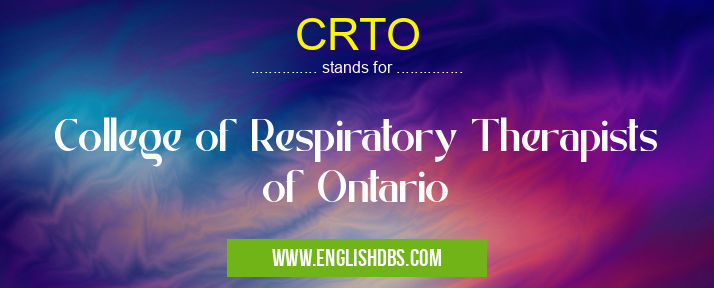What does CRTO mean in PROFESSIONAL ORGANIZATIONS
The College of Respiratory Therapists of Ontario (CRTO) is a self-regulatory body that ensures respiratory therapists practice safely and ethically in the province. As a regulatory college, CRTO sets standards for entry to practice, monitors quality of care provided by respiratory therapists and holds its members accountable. The organization also provides a range of professional development services to its members, as well as guidance on best practices.

CRTO meaning in Professional Organizations in Business
CRTO mostly used in an acronym Professional Organizations in Category Business that means College of Respiratory Therapists of Ontario
Shorthand: CRTO,
Full Form: College of Respiratory Therapists of Ontario
For more information of "College of Respiratory Therapists of Ontario", see the section below.
Essential Questions and Answers on College of Respiratory Therapists of Ontario in "BUSINESS»ORGANIZATIONS"
What is the College of Respiratory Therapists of Ontario?
The College of Respiratory Therapists of Ontario (CRTO) is a professional regulatory organization that exists to serve and protect the public by establishing standards, processes and required competencies for the safe provision of respiratory care services in Ontario. It regulates its members in accordance with the Health Professions Procedural Code, which is enacted under the Regulated Health Professions Act, 1991 and sets out what they must do to practice safely and ethically.
Who can become a member of CRTO?
Any individual who has met all requirements to be registered as a respiratory therapist in Ontario may become a member of CRTO. Applications for membership are available on their website.
What are some benefits of becoming a CRTO member?
By becoming a member you will have access to important resources such as continuing education opportunities, professional development opportunities and updates about CRTO activities. Membership also provides access to a network of other professionals in your field, which provides an opportunity to engage with peers and share best practices. Additionally, members benefit from being part of the larger profession and having direct input into important decisions that shape regulation within Ontario healthcare settings.
How can I renew my CRTO membership?
All current members must complete an annual renewal process between November 1st and December 31st each year. This includes completing an online application form as well as providing proof that you have completed continuing education requirements detailed by the College’s Regulatory Framework for Continuing Competency (RCC). Once you have successfully completed these steps, your membership will automatically be renewed for another year if applicable fees are paid before December 31st each year.
How often do I need to take additional training or recertification courses?
According to CRTO's Regulatory Framework on Continuing Competency (RCC), all active members are required to participate in ongoing learning activities on an annual basis. The amount and type of knowledge activity will vary depending on your scope/level of practice but should include at least 30 hours across core competencies outlined by RCC guidelines.
As a respiratory therapist, how can I find work opportunities?
Employment opportunities for registered respiratory therapists generally fall within three categories- hospitals/acute care settings; home health/community; long term care facilities/complex care settings. Most job postings will list if they require certification or registration with specific organizations such as CRTO. You may also consider signing up with recruitment agencies that specialize in connecting employers with qualified healthcare professionals or visit job boards listing postings specifically for RTs ([https://www.healthcarejobsitecanada.com], etc.).
Do I need additional certifications or qualifications before practising in Canada?
All applicants must be eligible for registration according to criteria outlined by CRTO's Member Qualification Regulation prior to commencing practice in Canada either through a work permit or immigration process). In addition any applicant must demonstrate language proficiency according to accepted parameters set out by Education Quality Assurance (EQUIP) standards prior commencing employment in Canada as a RPTH practitioner.
Are there any residency requirements while practicing as a Respiratory Therapist in Ontario?
Yes - according to Registration Regulation 108/00 section 6 it states that “no person shall practise respirology unless he or she resides within 500 kilometres from Toronto”. However this requirement may not apply when given approval from the Registrar based upon extenuating circumstances such as practice location being more than 500 kilometers away.
Does smoke inhalation qualify as one type of medical condition where RPTH service is needed?
Yes - Smoke inhalation is one form where registered respiratory therapists provide service and specialized care for patients suffering from acute/chronic pneumonias, asthma exacerbations, COPD exacerbations or other lung related illness. This would mainly involve stabilizing patients in case scenarios such as providing oxygen therapy, postural drainage, bronchial hygiene, monitoring pulmonary function tests etc.
Final Words:
The College of Respiratory Therapists of Ontario plays an important part in ensuring best practices are followed when it comes to providing care related to respiratory health. They set high educational requirements and monitor member performance so that Ontarians can rely on experienced professionals when seeking help with breathing issues or other pulmonary health concerns.
